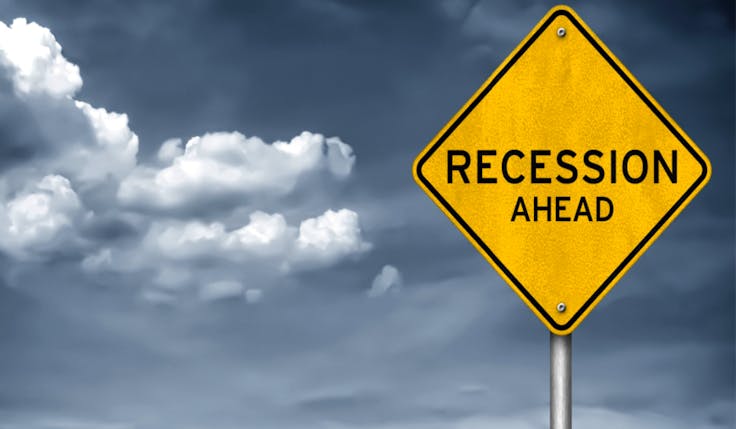To make marketing the solution in a recession pay close attention to the numbers
New data highlights the strategies that succeed in a recession and why advice to avoid going dark is too blunt.

Up until last week, talk of recession was just that. Talk. But now it’s actually happening. GDP figures just out show the economy is getting smaller.
And so, in every business, fraught conversations are going on. Finance departments are questioning every purchase and marketers are working on how to be part of the solution, not part of the problem.
The numbers matter in these debates. CFOs need evidence they can believe on what should be kept versus what can be cut. The ideal is a recent, econometrics study, done and communicated properly.
Those without econometrics must be content with looking to the past, but it’s tough. The well-established evidence for ‘Don’t go dark’ is now 30-years-old, and it’s hard to rely on advice that’s the same for every business.
‘Don’t go dark’ is too blunt
So, this year, to add more recent evidence, Magic Numbers partnered with the IPA to look at the strategies that worked during the Covid-19 recession.
We found that ‘Don’t go dark’ is too blunt as a piece of advice.
Recessions change the economy as well as causing it to contract, and that means some sectors really suffer, others are only affected a little, and there are even some that actually benefit. The economic change is different in each recession, so different sectors are victims versus beneficiaries, but the effect is never entirely even.
Using the ARC database (almost 500 econometrics evaluations by OMG, D2D, IRI, Ekimetrics, Magic Numbers and VCCP) we studied successful strategies during Covid.
We found that:
- In sectors where the effects of the economic upheaval are worst and the bounce-back may not come, it’s better to postpone advertising until the recovery – to go dark.
- In sectors that are relatively secure, the best strategy is to look for low-cost media buys, when competitors are quiet for cheap share of voice and so good value campaigns.
- In sectors that actually benefit from changes in the economy, advertisers can and should make the most of the opportunity with big bets in the advertising plan.
Three data-led pointers for marketers during budget season
Only buy the dip if you’re going to get the bounce
The ‘Don’t go dark’ advice is advertising’s equivalent of a strategy investors use – buying the dip. You buy an asset for cheap when no-one else is buying, in this case mental availability. Then you sit back and enjoy the profits when demand recovers, and with it, the value of your asset.
This strategy absolutely works as long as your sector is secure.
In FMCG, which was a secure sector during Covid, advertisers followed the advice. They increased spending at a time when media costs were low, and they got high returns per £1 spent.
The chart below shows the evidence from ARC. The left pane shows a higher proportion of FMCGs spent £3m or more per year during Covid, and the right pane shows the more FMCG advertisers spent, the higher their return on investment.
 The trouble is that buying the dip is risky. There’s always a possibility that the dip turns into an ongoing downward trend, that the asset loses all relevance, that demand never recovers.
The trouble is that buying the dip is risky. There’s always a possibility that the dip turns into an ongoing downward trend, that the asset loses all relevance, that demand never recovers.
During Covid, bricks and mortar retail is a very obvious example where for most businesses, buying the dip was actually a terrible and very costly idea. It just didn’t make sense to continue spending on advertising when shops were closed, it was hard to pay the rent and there was a genuine risk of not surviving to see the bounce back.
 Of course, not all businesses in a victim sector in a recession will close down, and there are often clues in the run up to the recession as to which will survive, and which won’t.
Of course, not all businesses in a victim sector in a recession will close down, and there are often clues in the run up to the recession as to which will survive, and which won’t.
For example, in the pandemic, betting shop closures were common, and even now they continue to close. Look a bit more closely and the clues were there before we’d even heard of Covid-19. People prefer to bet in private and from home – it’s an activity that was already moving online.
Ritson’s recession playbook: 9 steps marketers should take to survive the dark times ahead
Seize opportunities – they do arrive for some in recessions
This same logic is useful for identifying sectors where there might be opportunity in recession. If the world has been changing in favour of a particular sector in the run up, it could well be a beneficiary.
During Covid, anything involving ecommerce or digital transformation benefitted. True, this was because of enforced staying at home. But it’s also true that many people and businesses simply accelerated behaviour change they’d already been planning.
And the right strategy for advertising? Well in Covid, ecommerce businesses made big bets. They spent more, started using TV a lot more and committed to proper evaluation.
 The ARC data allows us to see the results of those big bets, and the finding is that they paid off. On average during Covid, ecommerce advertisers saw a 30% uplift in revenue driven by advertising and got a return of £3.60 for every £1 spent.
The ARC data allows us to see the results of those big bets, and the finding is that they paid off. On average during Covid, ecommerce advertisers saw a 30% uplift in revenue driven by advertising and got a return of £3.60 for every £1 spent.
Right now, marketers need to do the maths
What brings all of these stories together is a little bit of useful maths.
It goes like this: If cheap share of voice is available in recessions, it’s a good value way to buy a bigger share of your sector later on. But what that share is worth depends on how big your sector is now, and after the recession. If the payoff is a slice of a smaller pie, share of voice has to be really very cheap to make spending worth it.
In this calculation, cost of media matters, and so does what competitors do. But whether to go dark or not also depends on the trajectory your category is and will be on.
 At Magic Numbers we are using this framework with clients, along with our own research on trajectories for different sectors, to war-game strategies for advertising, pricing and positioning.
At Magic Numbers we are using this framework with clients, along with our own research on trajectories for different sectors, to war-game strategies for advertising, pricing and positioning.
This works best when it’s combined with econometric analysis that’s already established how the economy affects the business concerned.
But it’s also possible to do something simpler if you’re handy with a spreadsheet, and can google sector level forecasts from PwC, KMPG, Deloitte, and others.
Making marketing part of the solution in recession isn’t about repeating mantras, it’s about leading fraught conversations and it’s about huddling round the numbers, making friends with finance.
In the end, theirs is the language that matters right now.








Comments